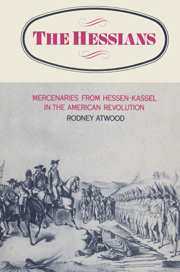Book contents
- Frontmatter
- Contents
- List of maps
- Acknowledgements
- Abbreviations
- Note on German ranks and currency
- Introduction
- 1 The German soldier trade
- 2 The Hessians go to America
- 3 The victories of 1776
- 4 The Battle of Trenton
- 5 The campaigns of 1777–81
- 6 Anglo-Hessian relations
- 7 The Hessian view of the American Revolution
- 8 Hessian plundering
- 9 Hessian desertion
- 10 Recruiting in Germany
- 11 The impact of the war on Hessen
- 12 Conclusion
- Appendices
- Bibliography
- Index
6 - Anglo-Hessian relations
Published online by Cambridge University Press: 04 August 2010
- Frontmatter
- Contents
- List of maps
- Acknowledgements
- Abbreviations
- Note on German ranks and currency
- Introduction
- 1 The German soldier trade
- 2 The Hessians go to America
- 3 The victories of 1776
- 4 The Battle of Trenton
- 5 The campaigns of 1777–81
- 6 Anglo-Hessian relations
- 7 The Hessian view of the American Revolution
- 8 Hessian plundering
- 9 Hessian desertion
- 10 Recruiting in Germany
- 11 The impact of the war on Hessen
- 12 Conclusion
- Appendices
- Bibliography
- Index
Summary
The British already had experience of quarrelling and disagreement in an army composed of their own troops and various mercenary contingents. Only with the greatest difficulty had Ferdinand of Braunschweig welded the whole together in the Seven Years War. Despite the success of Ferdinand's army, the various parts did not always pull smoothly in harness together. In November 1758 it was reported that Lord George Sackville, commander of the British corps, had so offended Britain's paid German allies that none of them could bear him and a fracas between the different contingents would soon break out. Relations between Ferdinand and Sackville were so strained that the latter declined to support his commander at an important moment during the battle of Minden. No Hessian general let down the British so badly in America.
Of the various mercenary contingents serving in the middle colonies, only the Hessians had general officers. Riedesel commanded a brigade on Long Island during the first six months of 1781, but most of his service was in Canada or with the Convention Army. The senior Ansbachers, Waldeckers, and Hanauers were battalion commanders, and an extract from Miinchhausen's letters sums up the British attitude to them: ‘For the occupation of Amboy [12 June 1777] there are left behind two Ansbach regiments, one Waldeck, and one English, under the command of Colonel von Eyb of the Ansbachers.
- Type
- Chapter
- Information
- The Hessians , pp. 144 - 157Publisher: Cambridge University PressPrint publication year: 1980

